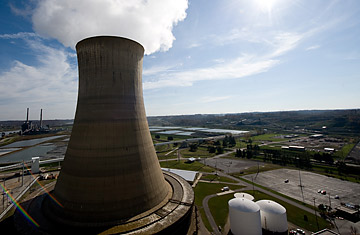
American Electric Power's Mountaineer coal power plant, including cooling tower and stacks in New Haven, West Virginia.
Climate change advocates haven't had much to celebrate recently, but New York City Mayor Michael Bloomberg's announcement last week that he was giving $50 million to the Sierra Club's Beyond Coal campaign marked a real win. The Sierra Club — the nation's largest environmental group — has successfully stopped more than 150 proposed coal plants from being built over the past decade through the campaign. Bloomberg's money — and perhaps more importantly, the imprimatur of one of the richest and most influential people in the country — will enable the Sierra Club to bring its war on coal to a new level, preventing untold millions of tons of greenhouse gas emissions from warming the planet.
Yet when I spoke to Bloomberg before his donation became public, climate change wasn't foremost on his mind. He saw coal pollution first and foremost as a public health issue, one that is directly hurting Americans through higher rates of asthma and heart disease. He was certainly worried about the greenhouse gases those coal plants were spewing — coal is responsible for about 20% of global carbon emissions — but what really motivated him were the mercury emissions, the particulates, the arsenic and all the other conventional poisons created by burning coal. "Coal kills every day," Bloomberg told me. "It's a dirty fuel." So it is with the Sierra Club's Beyond Coal campaign, which has succeeded more by motivating individual communities over the local health effects of coal pollution than by appealing to the broader risks of global warming.
If we're smart, this approach might be the new way to attack climate change: by identifying actions that can provide a wealth of benefits — including on carbon emissions — rather than simply focusing on global warming alone. That's the message of a new paper called "Climate Pragmatism" that's being published today by a bipartisan range of thinkers on energy and climate issues. The best way to deal with climate change, as it turns out, is not to deal directly with climate change. As the authors write: "Policymakers today are likely to make the most progress to the degree that they refrain from centrally justifying energy innovation, resilience to extreme weather and pollution reduction as 'climate policy.'"
It sounds a bit confusing — if we're going to deal with climate change, why not just directly deal with climate change? The answer is simple: we can't, or at least, we refuse to. Over the past several years, even as the scientific case on manmade climate change has gotten stronger, the international system has failed again and again to reduce carbon emissions. The effort to produce a global carbon deal failed decisively in Copenhagen in 2009. In the U.S., a carbon cap-and-trade bill died in the Senate a year ago, and there's little chance it will be revived. Even Europe — home to the governments and citizens that seem to care about climate change the most — has gradually scaled back its ambitions on reducing carbon as the cost and complexity of those policies has become clearer.
The failure of the global deal is an inevitable consequence of what Roger Pielke Jr., a professor of environmental science at the University of Colorado and one of the authors of the "Climate Pragmatism" paper, calls "the iron law of climate policy." Any climate policy that is viewed as obstructing economic progress will fail — especially in large developing countries that are counting on rapid economic growth to lift citizens out of poverty. Take China, for example — while the country has emerged as a world leader in terms of clean energy investment, its leaders remain reluctant to sign onto any kind of meaningful carbon reductions. The economy comes first, with renewables supplying just a tiny portion of China's overall energy mix. Coal is and will be far more important, with coal imports in China and India slated to grow 78% in 2011.
This means any global carbon cap that would raise the price of fossil fuels significantly simply won't fly, in China or for that matter, in the U.S. But that doesn't mean there's zero willingness to consider the environmental or health perspectives of the energy we use. The developed world has vastly reduced air pollution over the past several decades through ever-tougher regulations on conventional pollutants like soot and acid rain causing sulfur dioxide. These are rules that, despite constant industry opposition, remain broadly popular among the public — much more popular than carbon regulations — because the benefit is visible, immediate and personal.
Developing countries will be no different. Conventional air pollution is a tremendous threat to Chinese growth and public health, as anyone who watched the Beijing Olympics in 2008 knows. Air and water pollution costs China an estimated 4.3% of its GDP each year, and globally, air pollution contributes to an estimated 3 million deaths a year. Any policies or efforts that divert investment from the dirtiest sources — as the Sierra Club is doing with its Beyond Coal campaign — towards cleaner alternatives like natural gas and renewables will benefit public health, while helping the climate as well.
